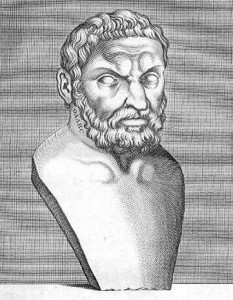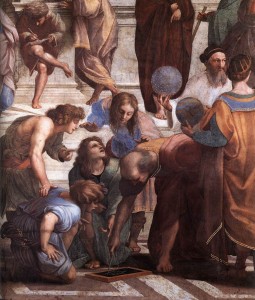Traditionally, the history of physics begins with the advancements made by Ancient Greek civilization. The Ancient Greeks are widely considered to have been the cradle of Western thought, and to have laid the foundations for modern understandings of mathematics, astronomy, and physics. Indeed, the science of astronomy was a precursor to the birth of physics, and the Greeks had a heavy hand in shaping the progress of astronomy for centuries to come.
There were several Greeks who made important contributions to the field of physics. Some of the first, however, were from the city of Miletus, beginning with the ideas of Thales (624 BCE-546 BCE). Bertrand Russell, the great mathematician and philosopher, is noted as having said that “Western philosophy begins with Thales.” Thales was one of the Seven Sages of Greece, who were revered by Greeks of the following centuries for their insight and wisdom. Thales heavily influenced Aristotle, who described Thales as the first philosopher in the Greek tradition.
Thales was a Milesian philosopher credited with what is often described as the “discovery of nature,” or the realization of the fact that natural phenomena are explicable in terms of matter interacting according to natural laws. This was contrary to the prevailing view that natural phenomena were the arbitrary result of the ever-shifting moods of the gods of the Greek pantheon. Thales ultimately outrightly rejected the idea of mythological explanations for nature, attempting to explain all of his ideas without the use of mythological references. Because of this, his unique ideas became highly influential.
An example of Thales’s more naturalistic, less mythological explanations of nature was his postulation that the flat earth lay on a vast ocean, and that earthquakes were caused by disturbances in the waters of the ocean. The common belief was that earthquakes were caused by the rage of the sea-god Poseidon. A fellow Milesian, Anaximander, later suggested that lightning was caused by wind splitting up clouds, rather than by Zeus.
The take-away point about these ideas is not their level of correctness or incorrectness, but their relative correctness; they were revolutionary ideas in that they did not involve fantastical, mythological explanations. They were also revolutionary in that they were not to be taken as truth. These early scientists admitted incomplete knowledge of the workings of nature, and it was assumed that each new hypothesis was a topic of debate amongst the scientific community. The Milesians, therefore, were an important example of an early culture of rational scientific debate.
Another important contribution by Thales was his methodology. Thales was one of the first to define general principles of science and set forth hypotheses. These critical ideas have led many to dub him the “father of science,” although this is sometimes disputed.
His belief in rational as opposed to mythological explanation was not the only meritorious contribution of Thales. He also was responsible for leaps and bounds in geometry. Thales once said “Space is the greatest thing, as it contains all things.” There is a story in which he calculated the height of a pyramid at the moment when his shadow was the same length as his height. Since Thales understood right triangles, he knew that the distance from the tip of the shadow to the pyramid’s center would have been the same as its height. Thales’s knowledge of triangles allowed him to create Thales’ Theorem: DE/BC = AE/AC = AD/AB.
However, several other Greeks contributed significantly to the development of physics. The most notable, of course, is Aristotle. Aristotle will not be discussed in this post in order to devote the space of a full post to him later on.
Euclid (300BC), however, is worthy of discussion. Euclid’s contributions to geometry are critical for our understanding of space, and thus of all things physical. In particular, his work Elements, consisting of thirteen books, established Euclidean geometry and modern understanding of mathematics. Copernicus, Kepler, Galileo, and Newton were all influenced by Elements. Euclid’s Phaenomena described spherical astronomy. This was crucial, as it is well established that astronomy formed the basis of primitive physics. His work On the Heavy and the Light contains concepts like specific gravity and several propositions. Little is known about Euclid’s life, and he lives on solely in the substance of his works. Many famous physicists, from Einstein (carrying his “little holy book of geometry,” Elements) to Galileo were heavily influenced by Euclid. Even Abraham Lincoln would carry a copy with him in order to sharpen his logical skills as a lawyer “You never can make a lawyer if you do not understand what demonstrate means.”
Many, many Greeks deserve attention as laying some of the earliest (at least Western) foundations of modern physics. However, due to limited space, Thales and Euclid will have to suffice for now. Next, I will examine the fundamental contributions of Aristotle to the creation of modern physics. Aristotle was extremely important, and will be covered in full in the next post.





